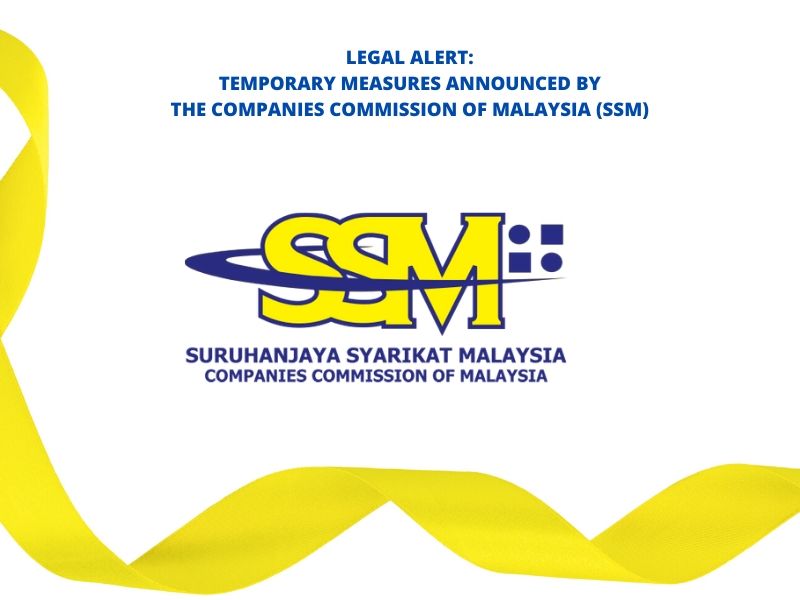Legal Alert: Temporary Measures Announced by The Companies Commission of Malaysia (SSM)
by Lavinia Kumaraendran & Sean Tan Yang Wei ~ 11 April 2020


Lavinia Kumaraendran
Email: lkk@thomasphilip.com.my

Sean Tan Yang Wei
Email: tyw@thomasphilip.com.my
The effects of the COVID-19 pandemic in all probability would have disrupted businesses particularly SME’s and the economy as a whole. With the Movement Control Order (“MCO”) being put in place in order to stem the spread of the virus, companies of all sizes are facing increasing strain to stay afloat.
Now that the MCO has been extended for a further 2 weeks (taking the total duration of the MCO to 6 weeks), the Companies Commission of Malaysia (“SSM”) under the purview of the Ministry of Domestic Trade and Consumer Affairs has announced that they will be implementing several temporary measures to help Malaysian companies navigate through and survive these unprecedented times.
In this article, we give you a brief summary of the measures announced by SSM.
1. Increased the Winding Up Threshold from RM 10,000 to RM 50,000 and Statutory Demand Time Period Extended to 6 Months
A significant measure announced by SSM is that they have increased the definition of a company’s ‘inability to pay its debts’ to RM 50,000. Under normal circumstances, a company can only be wound up if it is indebted in a sum of more than RM 10,000 (pursuant to the Federal Government Gazette dated 27.01.2017 and Section 466(1)(a) of the Companies Act 2016).
Further, the timeline for responding to statutory notices of demand has also been increased to 6 months – a significant increase from the usual time frame of 21 days. These changes are expected to be in place until 31.12.2020. The Minister presumably would have exercised his discretion under section 615 CA 2016.
This means that creditors are now only allowed to present a winding-up petition against a company debtor if the debt owed by the company is in excess of RM 50,000. The 6-month period for responding to statutory demands also means that it will be harder for a company to be deemed unable to pay its debts and therefore insolvent and gives companies the time to propose the corporate rescue mechanisms available under the CA during that time.
While these changes are welcomed to help businesses survive the economic downturn, more information is needed from SSM and the government on how these changes are meant to be interpreted. For instance, clarification will be needed as to when companies can gain the benefit from this measure such as:
- If a debtor had received a statutory demand issued under the law before the announcement and/or before the MCO, would the creditor be able to present the winding-up petition after the expiration of 21 days?; and
- What happens to winding-up petitions filed during the MCO period but before the SSM Announcement?
Therefore, it is paramount for SSM, the Government and/or the Minister to define a “prescribed period” (e.g. from 18.03.2020 – until the uplifting of MCO) during which, the companies can benefit from this temporary relief announced by SSM. This will negate any confusion that may arise as per paragraphs (i) and (ii) above. Should the prescribed period commence from 18.03.2020, the company will be required to reply to the statutory notice within 6 months.
Furthermore, it is perhaps arguable that this measure does not go far enough. The threshold of RM 50,000 is still a relatively low debt threshold for many of Malaysia’s SMEs. It is also worth noting that a similar measure introduced by the Singaporean Government raised the winding-up threshold from SG$10,000 to SG$100,000 (Section 22 of the Singapore COVID-19 (Temporary Measures) Bill (Bill No. 19/2020).
2. Timeline for Company General Meetings
The Announcement also suggests that any company which has to hold its Annual General Meeting may apply for an extension to do so for up to 3 months after the end of the MCO. Companies which intend to obtain such extensions of time is required to submit an application to SSM for their review. If approval is granted, then the company will be given an extension of time to call its general meeting within after the MCO. At the same time, there will be a waiver of the usual RM 100 fee which companies will need to pay to apply for such an extension of time.
Reference is made to Practice Directive No 6/2020 dated 7th April 2020 which contains the application form that can be filled in and submitted online.
This measure appears intent on balancing the necessity for companies to ensure that the company’s general meeting is held on time and that public safety is not compromised by requiring the shareholders of the company to attend physical meetings.
3. 30-Day Moratorium for Lodgement of Documents
For companies which have been experiencing difficulties in lodging their documents with SSM, SSM will be granting a 30-day moratorium from the last day of the MCO for companies do so. This moratorium will mean that no fines will be imposed on companies who have missed their filing deadlines with SSM as a result of the MCO as long as they complete the lodgement of the required documents within 30 days after the MCO is lifted.
While SSM does provide limited online facilities (such as the MyData and EzBiz platforms) during the MCO, most of SSM’s operations have been halted. As such, this is a reasonable measure to alleviate the problems companies will clearly be facing in lodging their documents.
4. 3-Month Extension for Filing of Statement of Accounts
In addition to the above, SSM has extended the time period for companies to lodge their statement of accounts to 3 months after the MCO. SSM will also be waiving the associated RM 100 fee. (Practice Directive No 6/2020 dated 7th April 2020)
This measure is clearly in line with the previous 2 measures. Companies would not be able to lodge and confirm their respective statement of accounts if they cannot hold their general meetings and if they are unable to lodge the same with SSM during the MCO. The 3 months extension (rather than a shorter 1-month extension) appropriately reflects the reality that companies will be requiring more time to complete and confirm their statement of accounts once the MCO is lifted.
This EOT application applies to companies with FYE September 2019 until November 2019.
5. Extension of “2020 Compliance of the Companies Act 2016 Campaign”
SSM will also be extending the “2020 Compliance of the Companies Act 2016 Campaign” until 30.06.2020. This campaign is aimed at encouraging companies to voluntarily remedy any offences committed under the provisions of the Companies Act 2016 by offering a 90% reduction of the maximum compound for such offences. Such offences include the company’s failure to lodge the statement of accounts, the failure to lodge their annual returns, and the failure to hold general meetings.
This campaign was originally intended to run until 30.04.2020 before the MCO was announced. With this extension, companies will still be able to obtain the 90% reduction of compounds from SSM if they rectify their non-compliance with the Companies Act 2016 before the campaign ends on 30.06.2020.
6. Exemptions of Approval for Companies Limited by Guarantee
This is an interesting measure announced by SSM and involves companies limited by guarantee (“CLBG”). CLBGs are essentially public companies which do not have share capitals but whose liabilities are guaranteed by its members. CLBGs are often used by non-profits and charitable organisations in Malaysia.
With the ultimate aim of encouraging and increasing charitable work by such organisations, it appears that SSM intends to waive (or at least loosen) the usual the approval process for CLBGs to collect donations and funds from the general public for the purpose of COVID-19 related charities. CLBGs which have previously obtained approvals from the Inland Revenue Board (or “LHDN”) will be automatically exempted from seeking SSM’s approval to collect such donations. Further, CLBGs which have not previously obtained approval from LHDN will still be allowed to collect such donations provided that these CLBGs submit a formal application for approval to SSM within 30 days after the MCO is lifted.
As such, CLBGs will be allowed to collect funds for COVID-19 charities without prior approval until 31.12.2020 and are required to record the donations collected and submit such records to SSM.
7. Extension of Time to Comply with Section 241 of the Companies Act for Company Secretaries
Finally, SSM has also announced that they will be extending the period for company secretaries to comply with the 20 CPE (‘Continuous Professional Education’) Points requirements for the renewal of their practicing certificates. This follows the cancellation and postponement of all courses organised by SSM in light of the MCO. As such, company secretaries have until 31.12.2020 to collect the points required to renew their practicing certificates.
However, this extension of time appears to be limited only to the collection of the required CPE Points. Therefore, company secretaries will still need to comply with the other requirements listed under paragraphs 34 and 35 of the ‘Guidelines Relating to Practicing Certificate for Secretaries Under Section 241 of the Companies Act 2016’. This measure also only applies to practicing certificates which will expire between 14.03.2020 and 31.12.2020.
Overall, these measures announced by the Government are a step in the right direction in such testing times to do what it can to help businesses stay afloat and survive. Nevertheless, the pivotal issue remains as to whether the Announcement or publication is legally binding or the force of law.
The Government should consider passing a bill like the Singaporean COVID-19 (Temporary Measures) Bill (Bill No. 19/2020) which codify and explain how these measures are to be implemented. Similarly, Australia had also on 22 March 2020 sought to amend its Corporations Act 2001 to implement temporary relief measures for financially distressed businesses due to COVID-19. The Coronavirus Economic Response Package Omnibus Act 2020 (CERPO Act) amendments were passed by the Parliament on 23 March 2020.
It is certain that the Government will strive to do what it takes to pass comprehensive legislation to provide clarity and certainty to its measures as announced. It is clear that the Announcement is intended to provide businesses with additional protection at a time when they will be considering how to maximise their prospects of weathering the impacts of COVID-19.